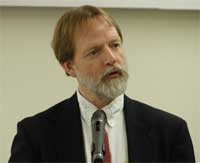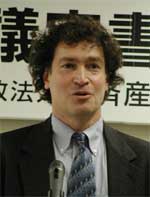Outline Report
KEYNOTE SPEECH I
 Economic efficiency and political feasibility is key to making tangible progress in mitigating climate change and protecting environment for future generations, two U.S. experts on the global warming said in a recent symposium.
Economic efficiency and political feasibility is key to making tangible progress in mitigating climate change and protecting environment for future generations, two U.S. experts on the global warming said in a recent symposium.
In their keynote speeches at RIETI Policy Symposium "Kyoto Protocol and Its Implementation" on March 19, Michael Toman, Senior Fellow of Washington-based Resources for the Future
, and Stanford University
Professor Lawrence H. Goulder, criticized the U.S. government's dropout from the Kyoto process and subsequent proposal of its own policy to tackle on the global warming.
At the same time, however, they said that the Kyoto Protocol has its shortcomings and the global community must start thinking ways to make climate change abatement mechanism more cost-effective and politically acceptable.
A "purposeful but gradual approach" has greater advantage over a mechanism under the Kyoto Protocol which places too much emphasis on emission control and mandates "substantial reduction over a short period of time," said Toman.
"A well-designed and cost-effective policy that uses economic incentives is essential for success in containing and eventually reducing greenhouse gasses," he said, stressing the need to balance environment and economic goals.
Such an approach would provide greater chance to improve and deploy greenhouse gas control technology while avoiding wasteful expenditures on misplaced policies, he said.
But technologies alone cannot solve the problem, not in the absence of policies and incentives for developing and using such technologies, he said.
A set of policies proposed by the administration of President George W. Bush, which provides tax incentives and subsidies for developing and using low-carbon technologies, has invited harsh criticism for setting emissions reduction targets far below the level imposed under the Kyoto Protocol.
The fundamental problem of the Bush administration's proposal is the lack of policy architecture that assures gradual but firm emissions reductions.
"Modest initial reduction is the right decision on economic grounds," he said. "The problem fundamentally, in my view, is that the administration proposals lay out no real mechanism that I believed to be credible and effective for achieving any emission reductions." The United States, instead, must commit itself today to a modest but mandatory emissions reduction target to be put in place by 2006, which would be followed by an architecture involving binding measures if it fails to achieve the target, Toman said.
In achieving such goals, he said, the U.S. should adopt a "cap and trade" system, setting certain caps on carbon emissions and allocating tradable emissions permits in a way to compensate those who suffer under climate change abatement measures, such as energy industry.
As to a longer-term approach beyond 2012, the end of the first commitment period under the Kyoto Protocol, Toman stressed the need to have developing countries participation.
Washington's approach in this regard, however, is just not workable, he said.
"We need to recognize that only with the passage of time, with economic progress, with the improved standards of living and the improved economic efficiency, can developing countries undertake serious long-term commitment of the type we are proposing for ourselves in the developed world," he said.
At the same time, he also urged developing countries to stop insisting on "approaches that would involve politically unrealistic transfers of income from the north to the south." " It is simply not acceptable in the U.S. and in any other developed countries," he said.
In concluding his speech, Toman urged the U.S. and the rest of the world to rethink their approaches in combating the global warming.
"The U.S. needs to take more positive stance. We must regain our leadership in this process rather than abandoning the process," he said. "But the other countries, the developed and the developing, must take seriously... this very strong piece of wisdom from a decade of economic research that a long-term problem must be approached as a long-term problem with gradual commitments, cost-effective commitments, and commitments that advance over time firmly but gradually. That is how we strike the balance between economic and environmental goals."
KEYNOTE SPEECH II
 Expressing his support for Toman's stance, Goulder proposed measures to enhance political feasibility of otherwise unpopular climate change abatement policies, which would involve higher energy costs on the public and profit losses at producers and intensive users of energy.
Expressing his support for Toman's stance, Goulder proposed measures to enhance political feasibility of otherwise unpopular climate change abatement policies, which would involve higher energy costs on the public and profit losses at producers and intensive users of energy.
"From the economic point of view, the most effective ones for addressing the emissions externality are carbon tax or tradable permits on carbon," Goulder said. "When fossil fuels are purchased, some of the social cost associated with their combustion is not ordinarily born by the purchaser. This means from the social point of view, the price of fossil fuels is too low and we depend too much on fossil fuels." Like Toman, Goulder expects little achievement from the Bush administration's plan, which rejects price-based approaches and instead emphasizes on subsidies and voluntary measures, a natural choice for the administration strongly supported by the energy industry.
"The approach focusing on technology subsidies alone is going to be rather wasteful and ineffective," Goulder said. "If we want to achieve our environmental goal at low cost to the society as a whole, we need upstream policies like carbon caps or carbon tax... (and) there are some ways of making them more politically attractive." Specifically, he called for giving out for free, or grandfathering, certain amount of emissions permits - in combination with corporate income tax breaks if necessary - to industries severely hit by the introduction of carbon tax and other climate change abatement measures.
That way, such industries would have incentives to reduce their use of carbon-based fuels without harming their profits, he said.
Although these policies involve the sacrifice of revenue and thus add to the overall costs, Goulder said, such additional costs would be minimum.
"If you think of how much revenues Japan, or the U.S. or any industrialized nation can potentially generate through a carbon tax or tradable permits, the amount of revenue you have to sacrifice in order to protect profits in upstream and downstream industries is very small fraction, may be 10, 15, and 20 percent," he said. "That certainly does not assure the political acceptability but at least raises chances." Although the legitimacy of such measures is debatable, Goulder said, "In tems of making climate policy more realistic and more likely to get through, we have to start thinking about compensation scheme."

